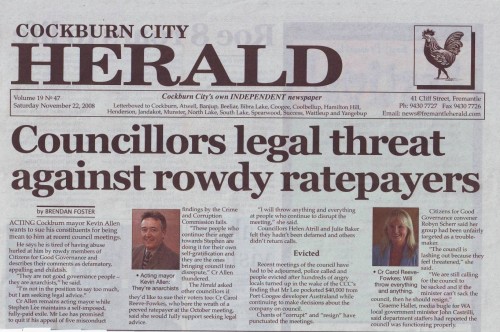 Six months ago an Indian energy corporation, Lanco Infratech, bought an Australian coalmine for $750 million dollars. Although, at the time, it agreed to lower-prices for customers, now it is telling the West Australian government that it will stop supplying electricity to West Australians by September unless Australian customers pay double.
Six months ago an Indian energy corporation, Lanco Infratech, bought an Australian coalmine for $750 million dollars. Although, at the time, it agreed to lower-prices for customers, now it is telling the West Australian government that it will stop supplying electricity to West Australians by September unless Australian customers pay double.  Six months ago Indian energy corporation, Lanco Infratech, bought an Australian coalminefor $750 million dollars. Although, at the time, it agreed to lower-prices for customers, now it is telling the West Australian government that it will stop supplying electricity to West Australians by September unless Australian customers pay double.
Six months ago Indian energy corporation, Lanco Infratech, bought an Australian coalminefor $750 million dollars. Although, at the time, it agreed to lower-prices for customers, now it is telling the West Australian government that it will stop supplying electricity to West Australians by September unless Australian customers pay double.

In 2006: the "Western Australia Domestic Gas Reservation Policy" aimed to safeguard LNG fuel supplies for Australians:
"The equivalent of 15 per cent of Liquefied Natural Gas (LNG) production from export gas projects will now be required to be reserved for domestic use as a condition of access to WA land for the location of processing facilities."
So a mere 15% of Western Australia's liquefied natural gas, which according to a report (PDF, 223K, linked to from here) of the DomGas Alliance, "Western Australia’s natural gas resources, could be fully depleted within 30 years," is to be reserved for domestic use and the remaining 85% allowed to be sent overseas.
As inadequate as the 2006 provisions to protect LNG will become in the face of increasingly savage oil and gas depletion, they are better than our policies of digging up and exporting coal as fast as possible, leaving absolutely nothing in reserve.
West Australian electricity supplies under threat from foreign ownership
Six months ago Indian energy corporation, Lanco Infratech, bought an Australian coalmine from Ric Stowe for $750 million dollars. Although, at the time, it agreed to lower-prices, now it is telling the West Australian government that it will stop supplying electricity to West Australians by September unless Australian customers pay double.
The Bluewaters power station (also owned by Ric Stowe) is itself in the process of being sold to two Japanese companies, Sumitomo and Kansai Electric.
The West Australian Premier, Colin Barnett, has been accused by the opposition state development spokesperson, Mark McGowan, of failing to safeguard West Australia's power supply by not having put in place a 'coal reservation policy' similar to the one already in place for West Australia's natural gas industry.
A chief executive of the holding company for Bluewaters, Griffin Group, Mr Ashcroft, is quoted by the Financial Review as saying,
"What is unfolding here is that our Collie coal will be more and more targeted for export with domestic supplies becoming a second priortiy and only at increasing prices."
Why is West Australian Liberal Premier Colin Barnett resisting these perfectly reasonable demands that he act responsibly and reserve that minimal amount of coal for the needs of Western Australians?
Source: "Barnett rejects call to set aside coal," The Australian Financial Review, Monday 20 June 2011
Don't mention the war
There is something politically incorrect about mentioning past wars because they are almost always a source of embarassment for current governments and the pseudo-sophisticated classes that would rather we all pretended that we were being governed for our own good. Take WW2, where about 40,000 Australians and even more Japanese lost their lives fighting each other on behalf of governments which claimed to be ordering this in the name of their homes and families.
How do Australians who lost their spouses, children and parents in WW2 defending Australia's security and resources deal with the bizarre fact that today's governments are signing our agricultural land, our mineral wealth, and our built infrastructure over in peace time in exchange for a bit of cash up front? Indeed, how does any Australian? Concerns are entirely justified. In ten years time when fuel prices are reaching beyond the wages of many households, the amounts paid today by the purchasers of these energy sources will seem paltry and ephemeral.
Surely it was obvious to our current leaders that our control over these increasingly scarce resources could not be guaranteed by mere sales contracts and polite agreements?
The problems now arising with Indian coal could be the beginning of the end. Are they a sign that members of our governments are just going to surrender, in exchange for cash, the bulk of our scarcest resources to any cashed-up foreign corporation that can then search the world for the most cashed-up market, leaving Australians high and dry?
The economic policy of globalism relies in part on the notion that the intertwining of interests and ownership globally will make countries too interdependent to engage in war. The problem is that globalism makes no provision to protect the rights of citizens and individuals to self-government locally and to maintaining control of essential services and resources locally. It doesn't prevent wars either. They are going on all over the place - in the name of peace and democracy - ironically .
Food security also ignored by our cash-mad 'leaders' this week
And just this week the Senate Economics Committee rejected calls by independent and Greens senators to create a special legislative national interest test for purchases of agricultural land above a certain threshold and to require the Treasurer to publish applications of interest in Australian farms online. The proposed laws were intended to protect Australia's food supply and to reveal the true owners of the nation's farming businesses. The reason for concern is that significant portions of Australian farming land are now being acquired by foreign nations with interests which could become conflictual to those of Australians. The Senate Economics Committee appeared to evade its responsibility, and really to condemn our economy, providing as their excuse for rejecting the legislative proposals the idea that Australia needs to sell off equity in order to create industry and jobs for Australians. They settled for an audit.
Source:http://www.aph.gov.au/senate/committee/agric_ctte/food_production/report/c02.htm Chapter 2 of Food production in Australia - Final report, Parliament of Australia, Senate Select Committee on Agriculture and Related Industries, 23 August 2010:
"Foreign ownership
2.47 Finally, the committee briefly explored the prospect of foreign ownership of Australian agricultural land, particularly the existing regulatory approach to major foreign land acquisitions.
2.48 The Foreign Investment Review Board (FIRB) informed the committee that investment in agricultural land by foreign investors is generally exempt from the requirement to notify the government in accordance with the Foreign Acquisitions and Takeovers Act 1975. Only if the acquisition exceeds 15 per cent of a business or corporation whose Australian interests are valued above $231 million, or where the investment is made by a foreign government or their agency, is it subject to scrutiny from the Australian Government to establish whether any national interest concerns are raised.[47]
2.49 The committee notes that incremental purchases exceeding the threshold amount in aggregate are not required to be disclosed. The committee also notes that in some countries the distinction between foreign governments and companies is not necessarily straightforward.
Committee view
2.50 Land available for agriculture is declining across the globe as expanding populations inhabit fertile land that could otherwise be devoted to food production. Although this problem is not as severe in Australia as it is in countries with a smaller land mass, urban encroachment is nonetheless affecting the capacity of Australian producers to grow food in the areas in which it is demanded, which in turn affects its quality and affordability. Competition for fertile land from mining and biofuels also threatens to reduce Australia's productive capacity.
2.51 The committee recognises that it is difficult for governments to dictate to landowners the purpose for which their land must be used, particularly when agricultural production may not presently be the most profitable possible use. However, Australian governments need to give serious consideration to mechanisms for protecting our most fertile agricultural land from alternative uses in the interests of our long term productive capacity and food security.
2.52 The committee also notes the marginal viability of agricultural production and the difficulty for potential young farmers to enter the sector, due to high land prices which combine to leave agricultural production vulnerable to structures that are less desirable than traditional family farming. Corporate farming models have the advantage of attracting extra capital to agriculture, though there are questions about the availability of labour and long term stewardship of the land. More significantly, though, Australia risks foreign companies, many with close ties to their home governments, purchasing substantial strategic interests in Australian land without needing to be vetted for national interest concerns. Australia needs to be careful that Australia's productive capacity is not undermined by foreign interests producing food on Australian land that is not intended for trade, but for direct supply to countries that have not managed their own food security needs.
Recommendation 1
2.53 The committee recommends an audit be undertaken to establish the extent of foreign ownership of commercial agricultural and pastoral land, and ownership of water, in Australia, with particular emphasis on ownership by sovereign and part-sovereign-owned companies."
 Perth, West Australia: A delegation of community leaders will deliver over 25,000 messages calling for the South West forests to be protected at Dumas House tomorrow. The event is the, "Voices for the Forests - Grand Postcard Handover," Wednesday, 10th March, 12 noon, Dumas House, 2 Havelock St, West Perth. Professor Fiona Stanley, will be joined by climate scientist and IPCC lead author, Dr Bill Hare, acclaimed actor, Kelton Pell, and a number of other well-known and influential West Australians at the event.
Perth, West Australia: A delegation of community leaders will deliver over 25,000 messages calling for the South West forests to be protected at Dumas House tomorrow. The event is the, "Voices for the Forests - Grand Postcard Handover," Wednesday, 10th March, 12 noon, Dumas House, 2 Havelock St, West Perth. Professor Fiona Stanley, will be joined by climate scientist and IPCC lead author, Dr Bill Hare, acclaimed actor, Kelton Pell, and a number of other well-known and influential West Australians at the event. 

 Six months ago an Indian energy corporation, Lanco Infratech, bought an Australian coalmine for $750 million dollars. Although, at the time, it agreed to lower-prices for customers, now it is telling the West Australian government that it will stop supplying electricity to West Australians by September unless Australian customers pay double.
Six months ago an Indian energy corporation, Lanco Infratech, bought an Australian coalmine for $750 million dollars. Although, at the time, it agreed to lower-prices for customers, now it is telling the West Australian government that it will stop supplying electricity to West Australians by September unless Australian customers pay double. 



 The Black Cockatoo Conservation Team has just pulled off a remarkable rescue of wildlife habitat. One West Australian Black Cockatoo colony has been saved from the developers, in the nick of time, but the species is still not out of danger. Video-link inside article.
The Black Cockatoo Conservation Team has just pulled off a remarkable rescue of wildlife habitat. One West Australian Black Cockatoo colony has been saved from the developers, in the nick of time, but the species is still not out of danger. Video-link inside article. Last year we ran an article calling for help to save land for the Black Cockatoo at
Last year we ran an article calling for help to save land for the Black Cockatoo at 
 In an effort to silence residents with difficult questions, Western Australia's Cockburn Council routinely limits question time and threatens residents who defy these limits with AU$1,000 fines. The Mayor, Stephen Lee, is now on extended leave after the Crime Commission had found him guilty of misconduct for having accepted an undeclared election campaign donation of AU$43,000 from the Singapore-controlled developer
In an effort to silence residents with difficult questions, Western Australia's Cockburn Council routinely limits question time and threatens residents who defy these limits with AU$1,000 fines. The Mayor, Stephen Lee, is now on extended leave after the Crime Commission had found him guilty of misconduct for having accepted an undeclared election campaign donation of AU$43,000 from the Singapore-controlled developer  How many council general meetings have the people who gave unquestionably support to the mayor, attended? Anyone who attends council meetings regularly, because they are interested in community affairs and process, will be aware of the rapid decline. Councillors could have halted the decline if they had requested further question time at any meeting. They did not once over-rule mayor Lee. Hence the community reaction and threatened with $1,000 fine if they spoke up for further time to ask questions or demanded answers to new planning developments, is to be expected from a vibrant community.
How many council general meetings have the people who gave unquestionably support to the mayor, attended? Anyone who attends council meetings regularly, because they are interested in community affairs and process, will be aware of the rapid decline. Councillors could have halted the decline if they had requested further question time at any meeting. They did not once over-rule mayor Lee. Hence the community reaction and threatened with $1,000 fine if they spoke up for further time to ask questions or demanded answers to new planning developments, is to be expected from a vibrant community.
 Councillor is acting Mayor whilst Mayor Stephen Lee is on fully paid leave whilst appealing against five counts of misconduct by the Crime and Corruption Commission for having accepted an undeclared AU$43,000 donation from
Councillor is acting Mayor whilst Mayor Stephen Lee is on fully paid leave whilst appealing against five counts of misconduct by the Crime and Corruption Commission for having accepted an undeclared AU$43,000 donation from 

 The University of Western Australia wants to bulldoze rare bushland in the middle of our city for future property development. The Minister for the Environment David Templeman is soon to make his decision on whether 60% of this pristine 36 hectare bushland will be destroyed to make way for offices and housing.
The University of Western Australia wants to bulldoze rare bushland in the middle of our city for future property development. The Minister for the Environment David Templeman is soon to make his decision on whether 60% of this pristine 36 hectare bushland will be destroyed to make way for offices and housing.
Recent comments